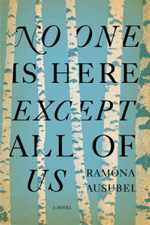
No One is Here Except All of Us is an imaginative novel where villagers try to escape the horrors of World War II by literally creating their world anew. With the power of collective belief, they rewrite their life stories and try to make them reality. But life in the new world is precarious. The novel explores whether it is possible to start life over, either as a community or an individual. Can stories change life's flow and, most importantly, its ending?
The Romanian village of Zalischik is small, with only nine families, and it is isolated due to its remote location and the river that surrounds the village, almost making it an island. The villagers feel safe in their little enclave and lead simple, rustic lives. But one night a stranger is washed up on the riverbank during a storm, and she has a horrifying story: Germans entered her village just days ago and killed everyone; she survived only by throwing herself into the river. The villagers' belief in their safety is shattered. What should they do? The stranger comes up with a plan, which Lena, the eleven-year-old narrator, intuitively understands and leads her family and neighbors in believing.
…."The beginning of the perfect world," I said.
"The beginning," the stranger repeated. "The world that is beautiful. Let there be chickens. Let there be trees. Let there be us. Let there be safe places to stay the night."
Eager to find a refuge, the villagers begin to recreate their world, using Genesis as a model, and the first morning is one of hope. But after several days of work and rest, flaws begin to appear in their perfect Eden. Parental preference creates sibling conflict, a flood hovers perpetually over the village, and the inhabitants must face temptation and make sacrifices. Most of all, they must reconcile themselves to a flawed creation.
Lena's life is one of the first to be rewritten when her mother decides to give her to a childless aunt and uncle. Kayla is desperate for children, and Hersh is desperate to make his wife happy and keep her from a looming madness. The couple take in Lena as their own, but Kayla is not satisfied. She wants a baby. So Lena must playact being a baby, after making a pact with her uncle that it won't last long: every three weeks will represent a year of life. This fantasy which Lena is forced to endure is a story of the creation of life, but is as futile an attempt as that of recreating the world.
Because Kayla believes that Lena ages a year every three weeks, soon Lena has surpassed her real age, and the pseudo-mother begins planning for Lena's wedding. A suitable match is made and again Lena's life is abruptly altered by a new story, that of being a wife and mother. This third phase of the book is about the creation of family, a family born from a story and the willingness of the villagers to believe it. But reality is the ultimate truth, and it eventually finds the small village. Once again, Lena is forced to start over, but this time she creates her own story.
Creative and with eloquent passages scattered throughout, No One is Here Except All of Us is an intriguing
first novel by Ramona Ausubel. The skeleton of the setting and plot is derived from the history of her own
family, but the story Ausubel tells takes place far beyond the facts to a fantastical place where the power
and limitations of creating life stories are explored. In addition, she questions whether or not it is possible
to have a new start, a new story, a tabula rasa. Suspend your everyday worldview and take a journey through
the imagination of a creative new talent.

Riverhead, hardcover, 9781594487941
